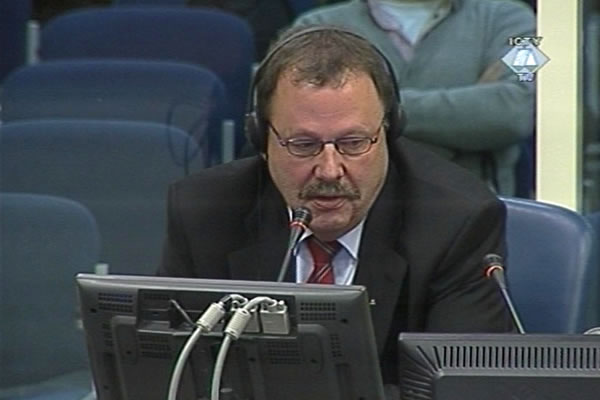Home
AIR SUPPORT CAME TO LATE FOR SREBRENICA
Dutch general Nicolai, former UNPROFOR chief of the staff gives evidence at the trial of the seven Bosnian Serb military and police officers charged with crimes in Srebrenica, confirms that the ‘blue helmets’ were instructed to withdraw from the checkpoints Mladic’s forces attacked on the eve of the VRS offensive that ended with the capture of the enclave
 Cees Nicolai, witness in the trial of the former Bosnian Serb officials charged with crimes in Srebrenica
Cees Nicolai, witness in the trial of the former Bosnian Serb officials charged with crimes in Srebrenica Kees Nicolai, former UNPROFOR chief of staff in BH, believes the air support called in by UNPROFOR came too late in Srebrenica in July 1995 because the UN leadership hesitated too long in approving the use of the NATO air force.
Testifying at the trial of Bosnian Serb military and police officers charged with crimes in Srebrenica and Zepa, Nicolai described that ‘close air support’ for the Dutch Battalion deployed in Srebrenica enclave had been postponed several times in June 1995 despite frequent attacks of the Bosnian Serb forces. After the ‘hostage crisis’ in May 1995, he explained, the UN command introduced restrictive guidelines for air support. The guidelines specified that it was better for the ‘blue helmets’ to withdraw if the UN checkpoints came under attack, than to call in NATO air strikes.
In June 1995, UNPROFOR responded to the attacks by making written and verbal protests to the VRS General Staff. In most cases, General Nicolai was the one to protest. The Dutch general said that the VRS General Staff would usually deny that ‘the VRS had anything to do with the attacks on the UN troops’. General Zdravko Tolimir and General Milan Gvero, with whom he communicated, kept saying this, and in his view those were ‘lies’. Tolimir was Mladic’s assistant for security and Gvero his assistant for morale and religious affairs in the VRS General Staff.
General Nicolai confirmed the authenticity of the minutes of these conversations, shown to him by the prosecution, including the conversation he had with General Gvero on 11 July 1995, on the day when NATO finally launched air strikes and when Mladic’s troops captured Srebrenica.
The minutes indicate that when Nicolai demanded that the VRS immediately stop attacking the enclave, Gvero said that he ‘couldn’t stop the attacks even if there were any’ because the ‘VRS is not attacking either UNPROFOR or the civilians in Srebenica’. Gvero threatened that General Nicolai and UNPROFOR would be considered responsible for any consequences if NATO air strikes didn’t stop.
General Nicolai took this as a threat that the VRS would shell the Dutch Battalion compound in Potocari where a large number of civilians from Srebrenica had already gathered. The air campaign stopped and the negotiations with the VRS command continued. They resulted in the withdrawal of UNPROFOR from Srebrenica on 21 July 1995. According to the agreement signed by General Rupert Smith, the commander of UN forces in BH, and Ratko Mladic in Belgrade on 19 July 1995 the Dutch soldiers were given a guarantee that they could ‘safely withdraw from the enclave with all of their equipment and weapons’.
General Nicolai supervised the withdrawal of the Dutch Battalion. In a video clip shown in court, Mladic is personally seeing the Dutch off and saluting the UN soldiers in the convoy. As there were many soldiers among the Dutch who, ‘after all that had happened didn’t want to salute Mladic’, General Nicolai decided to ‘decrease the tension and reduce the risk of the Dutch Battalion’s evacuation being disrupted’ and saluted the soldiers together with Mladic. He wanted to make it possible for the weary UN soldiers to salute him and not the hated Bosnian Serb general.
General Nicolai’s evidence continued with his cross-examination by General Milan Gvero’s defense.
Linked Reports
- Case : Popovic et al. - "Srebrenica"
- 2007-11-28 DEFENSE: UNPROFOR WAS ‘CARELESS’ AND ‘BIASED’
- 2007-11-22 PROSECUTION WITNESSES GIVE CONTRADICTORY EVIDENCE
- 2007-11-20 BUSES ON POTOCARI-KLADANJ ROUTE WERE ‘OVERBOOKED’
- 2007-12-03 FOLLOWING THE VIDEO TRAIL
- 2007-12-04 PROSECUTION OFFENDS "LE GRAND REPORTER"
- 2007-12-05 ‘LOST TAKES’ FROM SREBRENICA FILM
